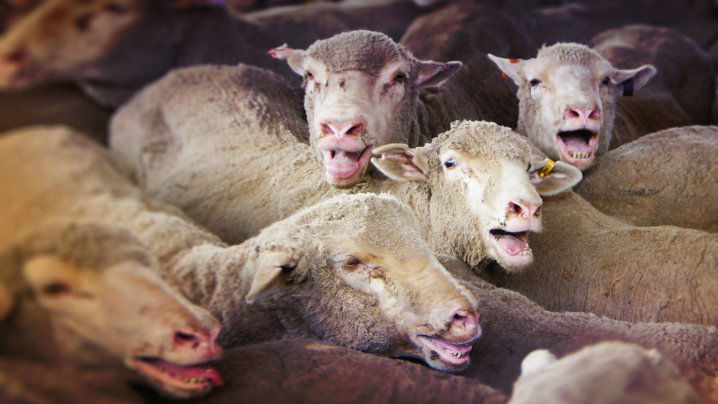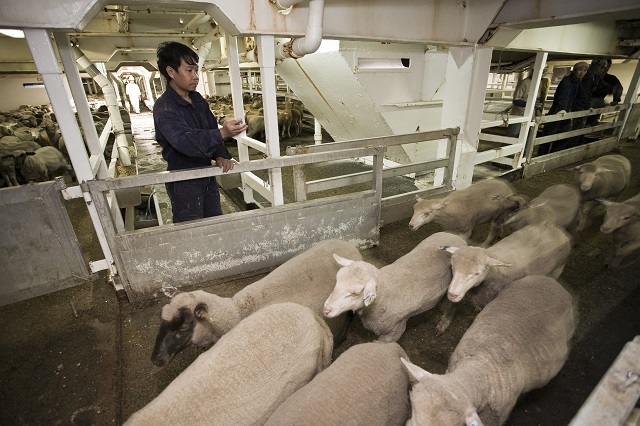Australia Rethinks Animal Welfare, Again

Australia's live export trade has historically been accompanied by significant public and veterinary concern for the welfare of transported livestock. Following incidents on livestock carriers in the 1980s, reviews into the trade have reported shortcomings in animal husbandry practices and facilities on board export ships.
A 1985 review of the live sheep trade by the Australian Senate Select Committee on Animal Welfare reported: “... if a decision were to be made on the future of the trade purely on animal welfare grounds, there is enough evidence to stop the trade. The trade is, in many respects, inimical to good animal welfare, and it is not in the interests of the animal to be transported to the Middle East for slaughter.”
At least 10 government and parliamentary reviews since 1985 have examined the live export system and its associated animal welfare issues. These reviews have led to significant regulatory reform, but reports of breaches continue to occur. A most recent case, in July 2016, saw 3,027 sheep die on a voyage from Fremantle to the Middle East – a journey from southern hemisphere winter to northern hemisphere summer.
Now, Australia's Federal Government has announced that it will conduct another review - a formal review of the Australian Standards for the Export of Livestock (ASEL). The ASEL govern the handling of animals in Australia’s livestock export supply chain from selection on-farm through to the point of discharge in the importing country.
Australia's latest review process will include the establishment of a technical advisory committee comprising an independent chair, two animal health and welfare experts, a person with an expert knowledge of the livestock export industry and a regulatory expert. It will be supported by representative from the livestock export industry, animal welfare organizations, the production sector and the veterinary profession.
The Australian Livestock Exporters' Council (ALEC) believes the review will provide outcome-based standards, backed by sound scientific evidence. ALEC Director and industry veterinarian Dr Tony Brightling said: “Australia is the global leader in livestock welfare practices, and the current ASEL standards are recognized as an international gold standard. However, livestock export is a dynamic industry. As such, it’s important to ensure ASEL is reviewed and updated to incorporate new technology and research findings.”
 Credit: ALEC
Credit: ALEC
Brightling highlights a May 2017 report released by the Australian Farm Institute that confirms mortality rates during ocean transport have significantly declined over time through better management and ship design, to the extent that losses are now comparable with or below normal farm rates.
Australia's leading animal welfare organization, the RSPCA, welcomes the review but has reservations about industry reports. RSPCA Australia Senior Policy Officer Dr Jed Goodfellow said, “If the review process is to be truly science-based, all research relied on in the review should be published in a peer-reviewed journal. Industry research reports that have not been published in peer-reviewed journals or not published at all should not form the basis of key animal welfare decisions.”
The RSPCA is opposed to exporting animals live for slaughter due to the inherent welfare risks. "Selecting the right personnel for this task will be crucial to the effectiveness and integrity of the review process,” Goodfellow says. "The review is long overdue, as the current 2011 version of the ASEL are based on outdated animal welfare science around stocking densities and bedding provisions and fail to ensure people handling animals are aware of their legal responsibilities and have the competency to carry them out.”
Goodfellow says that issues that require urgent consideration include onboard stocking densities, the provision and management of onboard bedding and heat stress prevention strategies. He says that scientific research that should be considered include heat stress analysis and David Mellor’s Five Domains model, a more science-based development of the Five Freedoms of Animal Welfare model.
.jpg)
Five Freedoms of Animal Welfare
Like the RSPCA, veterinarian Dr Sue Foster, spokesperson of Vets Against Live Export (VALE) is concerned about stocking densities on board. She highlights the 2016 voyage by the Al Messilah that had a 4.36 percent sheep mortality rate (3,027 sheep) saying, “It is clear that the current ASEL space requirements are insufficient to prevent suffering and death from heat stress. The Al Messilah voyage had extra space even before leaving Fremantle, and the sheep were spread out inside the ship even further after some animals were unloaded at destination ports. Whilst this may have helped, it did nothing to avert the catastrophe.
“It follows that the current ASEL space requirements are inconsistent with animal health and welfare, at least during Middle East summers. This converted old car carrier, with its closed decks, essentially had over 70-80 percent humidity (depending on deck) from Day 1 in winter in Australia,” said Foster.
“The point is that in 2016 we still have a catastrophic heat stress event, just as we did in 2013 with the Bader and for 30-40 years preceding that. This industry has not changed anything to stop heat stress. They may have slightly diminished its incidence, who knows, but that events such as these still happen says just what we all know - that the current heat stress risk assessment protocol isn't worth the paper it is written on.
“The industry’s current heat stress thresholds for sheep and cattle (defined in high mortality voyage reports as the maximum wet bulb temperatures at which body temperature can be controlled using available mechanisms of heat loss) are not supported by evidence from best-case experimental models where animals are housed individually and provided with more space. Ethics committees would likely not allow ASEL spaces!”
Foster highlights that the surviving sheep on the Al Messilah voyage gained weight. “The industry is always claiming weight gain as evidence of good animal welfare. Well. clearly an extreme high mortality voyage with heat stress recorded on all but five of the 23 days and over four percent sheep mortality is not a voyage where animal welfare has even been adequate, let alone good. Yet the survivors managed to put on weight, so weight gain is not a measure of animal welfare onboard ship.”
Sheep selected for live export shipment are not necessarily fit and healthy enough to load, says Foster. This is again evident in the documents obtained under the Freedom of Information Act for the 2016 Al Messilah voyage in which “flystrike” and “shearing sequel” were identified on Day 1 of the voyage.”
Foster says, although ASEL lists anorexia/inappetence as rejection criteria, the consequences of inanition (which starts in the feedlot) have consistently accounted for about 75 percent of all deaths on board ships.
Sheep are also routinely loaded with contagious pustular dermatitis (scabby mouth), says Foster. This disease, endemic in Australia and often regarded as unimportant despite morbidity that may reach 100 percent, is a rejection criterion in ASEL.
Foster cites research that calls for the welfare of animals to be monitored during transport using a range of behavioral and physiological measures in addition to documenting the extent of any disease, injury or mortality resulting from, or exacerbated by, transport. Measures of welfare status that are routinely employed (but absent from live export voyages) include assessment of heart rate, respiratory rate, body temperature, feed and water intake and urine output, behavior and environmental assays including those for air exchange/speed, temperature, humidity and ammonia levels.
ASEL requires that every voyage must have at least one accredited stock handler, with or without an accredited veterinarian (depending on the type of voyage), who are required to monitor and report on animal welfare. However, the stock handlers and veterinarians are directly contracted to the exporter and thus cannot be considered to be independent.
Under Australian law, exporters are required to comply with ASEL, but this is problematic since the exporter is the sole target of the relevant laws, while much of the live export chain lies outside Australia’s legal jurisdiction in international waters and overseas countries, says Foster. “The master of the ship is not accountable under Australian laws for any animal welfare problems, and the animals on board are not owned by the exporter.
“In addition, proof that the law has been broken requires proof of intention or recklessness to breach ASEL at the legal standard of beyond reasonable doubt,” she says, highlighting that export licenses are rarely suspended or cancelled. “There are also few impediments to exporters applying for an export license under another company name.”
The Federal Government's latest review is expected to be completed in 2019.
Australia's live export: a chronology
The opinions expressed herein are the author's and not necessarily those of The Maritime Executive.
